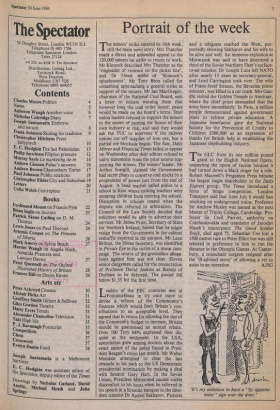Portrait of the week
The miners' strike entered its 16th week, still the main news story. Mrs Thatcher made a direct and unheeded appeal to the 120,000 miners on strike to return to work, Mr Kinnock described Mrs Thatcher as the `ringleader of violence on the picket line', and Dr Owen spoke of `Kinnock's spinelessness'. Mr Tony Benn called for something approaching a general strike in support of the miners. Mr Ian MacGregor, chairman of the National Coal Board, sent a letter to miners warning them that however long the coal strike lasted, peace would be made on the board's terms. Steel union leaders refused to support the miners to the extent of putting the future of their own industry at risk, and said they would ask the TUC to intervene if the railway unions cut off supplies of iron ore, but a partial ore blockade began. The Sun, Daily Mirror and Financial Times failed to appear on Wednesday after their editors refused to carry statements from the print unions sup- porting the miners. The miners' leader, Mr Arthur Scargill, claimed the Government had secret plans to conserve coal stocks by a programme of power cuts from the end of August. A head teacher called police to a school in Kent where striking teachers were stopping children from entering the school. Disruption in schools ceased when the dispute was referred to arbitration. The Council of the Law Society decided that solicitors would be able to advertise their services. Mr James Prior, Secretary of State for Northern Ireland, hinted that he might resign from the Government in the cabinet reshuffle expected in the autumn. Mr Leon Brittan, the Home Secretary, was identified in Private Eye as the victim of a smear cam- paign. The source of the groundless allega- tions against him was not clear. Eleven senior clergymen called for the consecration of Professor David Jenkins as Bishop of Durham to be deferred. The pound fell below $1.35 for the first time.
Leaders of the EEC countries met at Fontainebleau to try once more to devise a reform of the Community's finances which would limit Britain's con- tributions to an acceptable level. They agreed that in return for allowing the size of the Community budget to increase, Britain should be guaranteed an annual rebate. Over 100 Tory MPs expressed their dis- quiet at the settlement. In the USA, speculation grew among doctors about the exact nature of the polyp found in Presi- dent Reagan's colon last month. Mr Walter Mondale attempted to clear the last obstacle in his path to the US Democratic presidential nomination by making a deal with Senator Gary Hart. In the Soviet Union, President Mitterrand caused visible discomfort to his hosts when he referred in his speech at a Kremlin banquet to the dissi- dent scientist Dr Andrei Sakharov. Pictures and a telegram reached the West, pur- portedly showing Sakharov and his wife to be alive and well. An immense explosion at Murmansk was said to have destroyed a third of the Soviet Northern Fleet's surface- to-air missiles. Dr Joseph Luns left NATO after nearly 13 years as secretary-general, and Lord Carrington took over. The wife of Franz-Josef Strauss, the Bavarian prime minister, was killed in a car crash. Mrs Gan- dhi visited the Golden Temple in Amritsar, where the chief priest demanded that the army leave immediately. In Paris, a million people demonstrated against government plans to reform private education. A Japanese benefactor gave the National Society for the Prevention of Cruelty to Children £500,000 as an expression of thanks for British help in establishing the Japanese shipbuilding industry.
The GLC froze its one million pound grant to the English National Opera, suspecting the opera of racism because it had turned down a black singer for a role. Robert Maxwell's Pergamon Press became the largest single shareholder in the Daily Express group. The Times introduced a form of bingo competition. London Transport said that from July it would ban smoking on underground trains. Professor Sir Andrew Huxley was named as the next Master of Trinity College, Cambridge. Pro- fessor Sir Cecil Parrott, authority on Czechoslovakia and translator of Jaroslav Hasek's masterpiece The Good Soldier Svejk, died aged 75. Sebastian Coe lost a 1500 metres race to Peter Elliot but was still selected in preference to him to run the distance in the Olympic Games. At Canter- bury, a consultant surgeon resigned after the 'ill-advised move' of allowing a vet to
`It's my ambition to have a "by appoint- ment" sign over the door.'














































 Previous page
Previous page